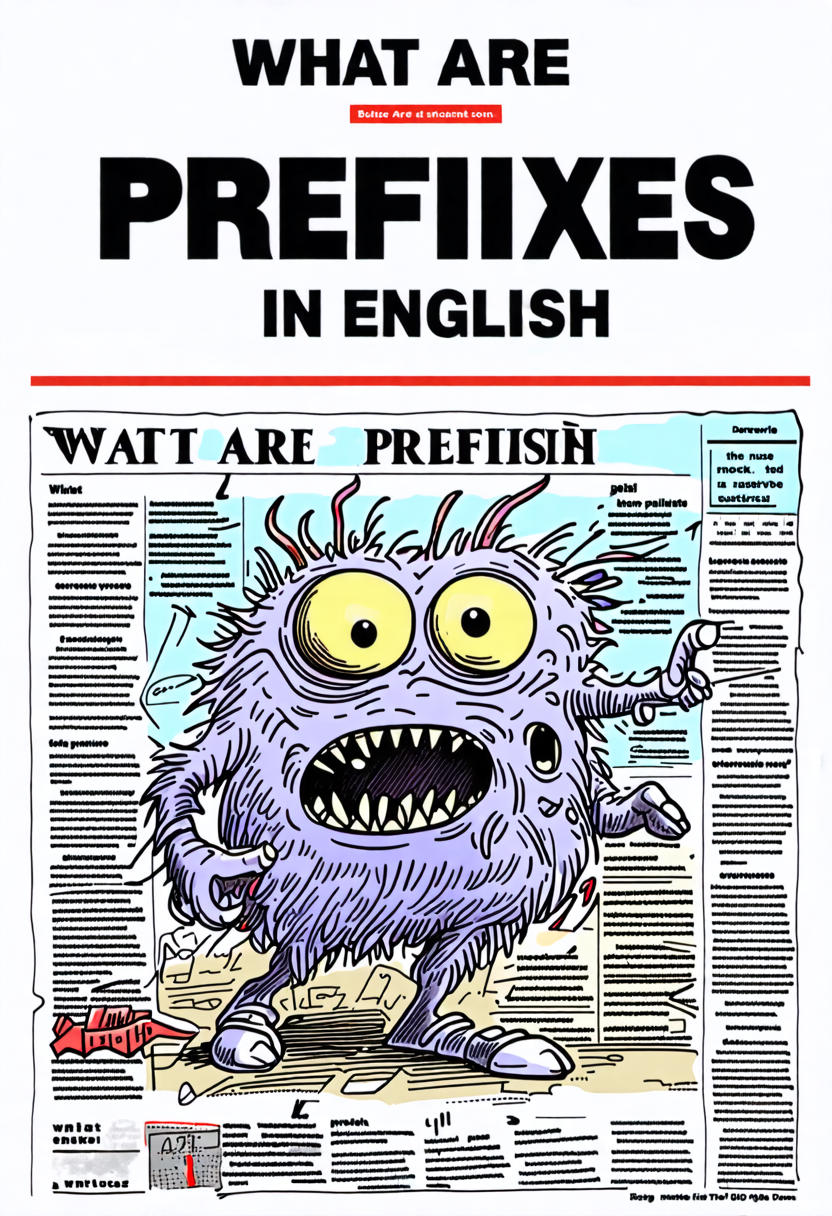What Are Prefixes in English?
Prefixes are affixed to the beginning of base words to change their meanings and form new words in English. They are typically one to three syllables long and convey specific, consistent meanings. Common examples include ‘un-,’ meaning ‘not,’ and ‘re-,’ meaning ‘again.’
Definition of Prefixes
Prefixes are affixes added to the beginning of base words to modify their meanings. They are important in English for creating new words and altering meanings.
For example, the prefix ‘un-‘ added to ‘happy’ forms ‘unhappy,’ indicating the opposite of happy. Prefixes can be one to three syllables long, such as ‘tri-‘ in ‘triangle,’ which signifies three angles. They consistently convey specific meanings across different words, making language more efficient.
Using prefixes can condense phrases into single words, enhancing clarity and brevity in communication. Hyphens are sometimes necessary with prefixes to avoid confusion or to maintain proper word forms.
Types of Affixes
Affixes, which include prefixes and suffixes, are added to base words to modify their meanings. These linguistic tools are essential for word formation and understanding.
Prefixes attach to the beginning of a word, while suffixes attach to the end. Both types of affixes serve vital roles in expanding vocabulary and refining meaning.
Key points about affixes:
- Prefixes: Added to the start of base words (e.g., ‘un-‘ in ‘unknown’).
- Suffixes: Added to the end of base words (e.g., ‘-ness’ in ‘happiness’).
- Infixes: Inserted within a word (rare in English).
- Circumfixes: Surround a word, with parts added at the start and end (not common in English).
Common Prefix Lengths
Understanding the common lengths of prefixes helps in recognizing and applying them effectively in English. Most prefixes are one or two syllables long.
For instance, ‘un-‘ (as in ‘undo’) and ‘re-‘ (as in ‘redo’) are single-syllable prefixes. Two-syllable prefixes include ‘inter-‘ (as in ‘interact’) and ‘under-‘ (as in ‘understand’).
Some prefixes, though less common, can be three syllables long, such as ‘hetero-‘ (as in ‘heterogeneous’) and ‘megalo-‘ (as in ‘megalopolis’). Knowing these common lengths aids in identifying prefixes quickly when reading and writing.
Consistent Meanings
While common lengths of prefixes help in their recognition, their consistent meanings across different words further enhance understanding and communication. Prefixes maintain specific meanings, making it easier to decipher new or complex terms.
For example:
- ‘Un-‘ typically means ‘not,’ as in ‘unhappy’ (not happy).
- ‘Re-‘ generally means ‘again,’ such as ‘redo’ (do again).
- ‘Pre-‘ often signifies ‘before,’ as in ‘preview’ (view before).
- ‘Mis-‘ commonly implies ‘wrongly,’ like ‘misunderstand’ (understand wrongly).

Uses of Prefixes
Prefixes are invaluable in condensing complex ideas into single, efficient words. They allow for the creation of concise expressions, making communication clearer and more direct.
For example, the prefix ‘pre-‘ can transform ‘view’ into ‘preview,’ indicating something seen beforehand. In academic and technical fields, prefixes classify and specify subjects, enhancing precision.
Negative Prefixes
Negative prefixes are essential tools for modifying a word to convey the opposite meaning. These prefixes are added to the beginning of base words to create antonyms. Common negative prefixes include ‘un-‘, ‘in-‘, ‘dis-‘, and ‘im-‘.
Here are some examples:
- Un-: Makes a word negative, as in ‘unhappy’.
- In-: Often used with adjectives, like ‘invisible’.
- Dis-: Used to express a reversal or absence, such as ‘disagree’.
- Im-: Applied before words starting with ‘p’ or ‘m’, for instance, ‘impossible’.
Prefixes With Hyphens
Understanding the importance of negative prefixes is crucial. It is equally important to recognize when prefixes require hyphens. Hyphens are used with specific prefixes like ‘all-,’ ‘ex-,’ and ‘self-‘. They are also necessary when attaching prefixes to proper nouns, ensuring clarity.
For example, ‘pre-World War I’ uses a hyphen to avoid confusion. Additionally, hyphens prevent the merging of identical vowels in words, as in ‘re-enter’. Hyphens are also essential when a prefix forms a word that already exists with a different meaning, like ‘re-cover’ (cover again) versus ‘recover’ (get better).
Are prefixes considered a type of affix in English grammar?
Yes, prefixes are indeed considered a type of affix in language morphology. They are attached to the beginning of a word to change its meaning or create a new word. Understanding the role of affixes in language morphology is crucial for mastering English grammar.
Hyphen Usage Rules
In certain cases, hyphens play an important role in maintaining the clarity of prefixed words. Hyphens help avoid confusion and guarantee precise communication.
Here are some essential rules for using hyphens with prefixes:
- Proper nouns: Use a hyphen when the prefix is added to a proper noun (e.g., pre-Victorian).
- Double vowels: Use a hyphen to separate identical vowels (e.g., co-operation).
- Repeated consonants: Use a hyphen if the prefix results in a repeated consonant (e.g., shell-like).
- Avoiding confusion: Use a hyphen when the prefix creates a word that might be misunderstood without it (e.g., re-cover vs. recover).
Prefixes in Word Formation
Beyond the rules of hyphen usage, prefixes play a fundamental role in word formation by modifying base words to create new meanings. By adding one to three syllables at the beginning of a word, prefixes can greatly change its meaning.
For example, the prefix ‘un-‘ added to ‘happy’ forms ‘unhappy,’ indicating a state of not being happy. Similarly, ‘pre-‘ added to ‘view’ creates ‘preview,’ meaning to see beforehand. Prefixes consistently convey specific meanings, enabling the formation of numerous new words. They simplify language by combining concepts into single words.
How Do Prefixes and Suffixes Both Contribute to Understanding English?
Understanding english suffixes is essential for grasping the meaning of words. Prefixes can change the entire meaning of a word, while suffixes modify the word’s grammatical function. Learning these components helps decode unfamiliar words and expand vocabulary. Ultimately, understanding English suffixes enriches language comprehension and communication.
Importance in Communication
Prefixes greatly enhance communication by allowing concise expression and reducing word count. They condense complex ideas into single words, making language more efficient and precise. This helps in various contexts, from everyday conversation to technical and academic writing.
Consider the following benefits:
- Clarity: Prefixes guarantee that the meaning of a word is immediately clear.
- Efficiency: They reduce the number of words needed to convey a message.
- Consistency: Prefixes maintain their meanings across different words, aiding understanding.
- Impact: They make writing more impactful by making it more straightforward.







